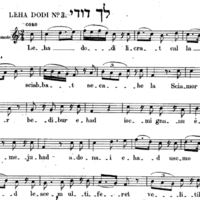Livorno repertoire
(a selection of recordings from Livorno. Click on the items on the map to listen)
The growth of Livorno as a mercantile hub from the XVI century onwards transformed it an important cultural centre. Gradually, Livorno became the capital of the Italian Sephardic world, picking up the sceptre from Venice. Livorno's role as crossroads between Europe and the Mediterranean is explored by Edwin Seroussi here: https://zamir.org/wp-content/notes/pdfs/2003/Seroussi.pdf .
The repertoire recorded by Leo Levi from the voice of rabbis Roberto Menasci and Simone Sacerdoti, and in later years by Daniele Bedarida, is one of the main instances of the Western Sephardic ritual, used in “Spanish and Portoguese” synagogues throughout the globe.
(manuscripts from Livorno in the Birnbaum collection, Cincinnati)
The Jews of Livorno, like their brethren in the Italian peninsula, received full citizenship rights in the second half of the 19th century with the making of the unified Italian state. Direct manifestation of such socio-political phenomenon was the birth of learned Jewish liturgical repertoire especially since the organ - a typical "Christian" instrument - and mixed choirs were introduced into the synagogue service.
While formally sticking to Jewish orthodoxy, the Jews of Livorno introduced many of the liturgical changes springing from the northern European Jewish reform and progressive movement, including, as said, the organ and other forms of learned music into the synagogue. This repertoire included adaptations of traditional tunes (as in the case of Moisè and Ernesot Ventura) as well as new works, some of which borrowed from the north European Jewish communities (e.g., Sultzer, Lewandowsky, etc.), some others being commissioned to local composers (for example Michele Bolaffi, many of whose manuscripts scores until today not accessible by the general public can now be found in the OTJIM), not necessarily all of them Jewish, who brough the echoes the of classic and operatic style into the synagogue.
In 1892, Federico Consolo, a Jewish musician and scholar originally from Ancona published in Firenze a wide collection of transcriptions he had made in Livorno, quoting as informant Moisè Ventura himself. Consolo's aim was to preserve what he perceived as very ancient melodies, coming way back from the heritage of sephardic Jews. How much real "antiquity" is there in these transcriptions is a matter of debate, but the document is certainly extremely valuable and interesting.




